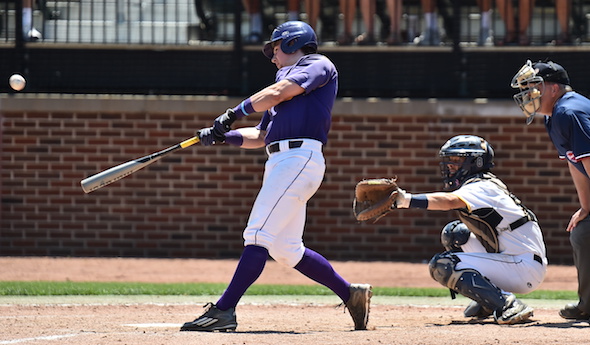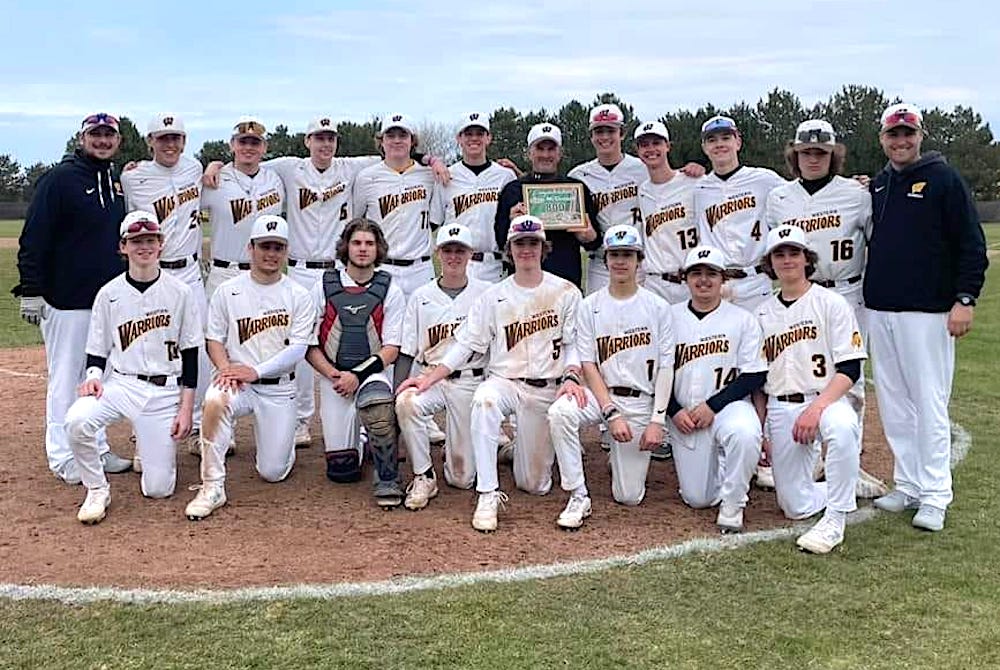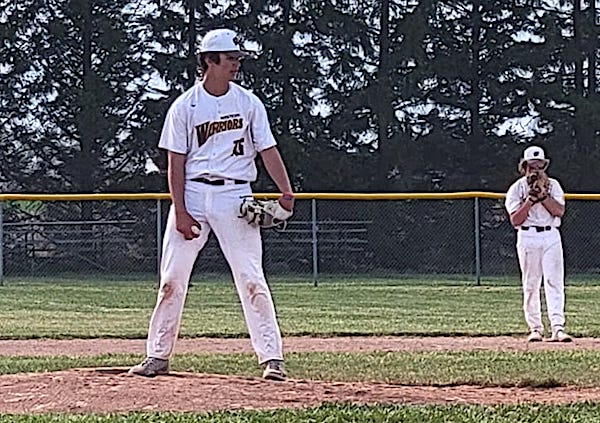
Early Bumps, Smooth Landing for DeLaSalle
June 18, 2016
By Andy Sneddon
Special for Second Half
EAST LANSING – A bunch of young Warren DeLaSalle Pilots earned their wings Saturday.
And from the looks of it, DeLaSalle baseball could be flying high for a while.
Sophomore Bryce Bush put the Pilots ahead to stay with a sixth-inning two-run single, and another sophomore, Nino Puckett, pitched out of a bases-loaded jam to notch the save as DeLaSalle defeated Saline, 7-6, in the MHSAA Division 1 baseball championship game at Michigan State University’s McLane Baseball Stadium.
It was the fourth MHSAA crown for DeLaSalle (28-13), which entered the tournament unranked. Second-ranked Saline (35-7) lost in the Final for the fifth time in school history.
Two other sophomores, starting pitcher Easton Sikorski and catcher Mac Graybill, played key roles in the Pilots’ victory.
“At the beginning of the year, we knew we might take our lumps a little bit and we did early on, but we grew from it,” DeLaSalle coach Matt Cook said. “We lost a lot of close games, a lot of one-run games. You learn from it and you chalk it up as experience and you move on and you try to get better every day.
“Our seniors, they kept this team together. You need leadership when you have a young team and five seniors – you couldn’t ask for better leaders. I didn’t name captains this year because all five of them were captains in my mind. They were the guys.”
The Pilots led 4-0 after two innings, but Saline chipped away and used a three-run sixth – highlighted by Sean O’Keefe’s two-run homer – to seize a 6-5 lead.
DeLaSalle responded in the bottom of the sixth as Matt Kostuch was hit by a pitch leading off. Brett Sandora pinch ran and was sacrificed to second. Graybill was then hit by a pitch, prompting Saline to go to its bullpen for O’Keefe.
An O’Keefe pitch was in the dirt and Sandora stole third, sliding in under the tag, while Graybill moved up to second. Bush then delivered a hard single back through the box, scoring Sandora to tie the score and Graybill with the go-ahead run.
“They read ball-in-dirt,” Cook said of his base runners. “We’re not a big stealing team, especially with Bryce Bush and (cleanup hitter) Rob Zurawski, we know they can drive guys in, so I don’t want to run into outs.
“We tell our guys read ball-in-dirt, and as soon as (Sandora) saw the ball go in the dirt he instinctually took off like he should. Thank goodness he was safe because that put Bryce in a great position. Bryce comes through time and time again.”
 Puckett relieved Sikorski to start the top of the seventh inning. Three walks – one intentional to O’Keefe – and a sacrifice bunt loaded the bases with one out. Puckett induced a 4-6-3 double play to end the game.
Puckett relieved Sikorski to start the top of the seventh inning. Three walks – one intentional to O’Keefe – and a sacrifice bunt loaded the bases with one out. Puckett induced a 4-6-3 double play to end the game.
Sikorski allowed six hits, walked two and struck out two in earning the victory.
Josh Nelson, Saline’s second pitcher, took the loss. He allowed three runs on two hits, walked three and struck out three over 4 1/3 innings. He had also entered Thursday’s Semifinal in relief, earning the win over reigning champion Hartland.
The Pilots entered the tournament with 21 wins against 13 losses – hardly an attention-grabbing win percentage. But few teams across the state can lay claim to having played the type of schedule that De La Salle did.
“Every Wednesday and Saturday, when we have our league doubleheaders, we’re facing some of the best teams in the state,” said Cook, who rattled off some of the Pilots’ opponents, a list that reads like a who’s who of the state best programs, including the likes of Orchard Lake St. Mary’s, Birmingham Brother Rice, Dearborn Divine Child, Detroit U-D Jesuit and Detroit Catholic Central.
In addition, the Pilots’ schedule this season included Sterling Heights Parkway Christian and Grosse Pointe Woods University Liggett, both of which played for MHSAA championships Saturday.
“It’s state-championship caliber baseball every game you play,” Cook said. “It puts you in position where you’re ready.
“We never played bad baseball this year; we always played good baseball. We were just learning to finish a day. We’d split doubleheaders, we’d win by a couple runs, we’d lose by one (run). We just learned to finish, play a complete day of baseball, and we started to do that and things started to roll and the kids were confident.”
PHOTOS: (Top) A Warren DeLaSalle hitter gets around on a pitch during Saturday’s Division 1 Final. (Middle) Saline shortstop Thomas Miller turns to throw to first base for a potential double play as DeLaSalle’s Ben Hyndman slides into second.

BC Western Writing Storybook Season with Celebrations, Early Success
By
Paul Costanzo
Special for MHSAA.com
April 26, 2023
Before a single pitch was thrown this season, there was plenty for the Bay City Western baseball program to be excited about.
 Some of it was historic: Coach Tim McDonald entered the year three wins away from 800 in his career, and, during the season, the program is set to celebrate the 10-year anniversary of the 2013 Division 1 championship team.
Some of it was historic: Coach Tim McDonald entered the year three wins away from 800 in his career, and, during the season, the program is set to celebrate the 10-year anniversary of the 2013 Division 1 championship team.
But the present was just as exciting.
Led by a strong group of seniors that started a program rebuild in 2021, the Warriors figured to have one of their strongest teams in years.
Then the pitches started getting thrown, and the excitement may have been kicked up a notch.
Western is 14-0 to start the season, and living up to its lofty expectations in a year where it just feels like everything is already a celebration.
“It’s kind of freaky the way it’s kind of lining up right now,” said senior pitcher Ben Kohany. “We have our goals in mind, but we’re still taking it game by game. Obviously, there is that pressure (from the program’s past success), but we’re just trying to take things slowly.”
Western’s success on the field this season is the result of a simple formula: good pitching, solid defense and the ability to manufacture runs.
It’s a formula that helps the Warriors to focus on what’s directly in front of them, and not look ahead when they have big postseason goals that could otherwise distract them.
“We just play together as a team – we trust each other, make plays and get the job done,” junior catcher Bryce Neitzel said. “Every day in practice we work on the fundamentals. Especially with bunting, we do a station of bunting every day. I feel like it does help, because whenever we’re in a situation in a game, we’re prepared for the moment. We kind of expect it.”
It’s also a formula that has won McDonald and the Warriors a lot of games over his 31 years as a coach – 811, to be exact.
“We have a philosophy, things we emphasize and things we work on,” McDonald said. “We’re kind of known for our small ball, and we kind of got away from that. This year’s team, one of the many things they understand is that at some point, that’s going to become important. They’re just rock solid. They’re a good practice team, and that translates.”
 When the season began, McDonald had 797 career wins, which put him 12th on the MHSAA’s all-time list. It took just three games, and a bit of serendipity, to become the 11th coach in state history to reach 800.
When the season began, McDonald had 797 career wins, which put him 12th on the MHSAA’s all-time list. It took just three games, and a bit of serendipity, to become the 11th coach in state history to reach 800.
The Warriors swept Flushing in their season-opening doubleheader, which gave McDonald the chance to get win No. 800 against his alma mater, Mount Pleasant Sacred Heart, in a game that was a late addition to the schedule.
And just to make it a little more personal, Sacred Heart is coached by Earl Hartman, who coached McDonald and is one of the 10 ahead of him on the all-time list; and McDonald’s nephew, Joe McDonald, was the starting pitcher for the Irish.
“It sounds like a Hollywood script, but that’s just how it all fell into place,” McDonald said. “It was certainly a neat day, and that just added to it.”
While McDonald knew how close he was to the milestone coming into the season, he wasn’t planning on making a big deal of it. The people around him, of course, had other plans.
“They had cupcakes, and my AD got a plaque made for me,” McDonald said. “Somebody did some work behind the scenes, and all of that is appreciated. I’m proud to represent this program. If me, as the head coach, has a lot of wins, that means the school has a lot of wins. I’ve been fortunate to be in a good baseball community. They had good baseball before I came. I’m proud of the foundation that we built, and I think it’s just continued on.”
Getting to be part of that historic moment was a thrill for the current Western players.
“That was super cool,” senior third baseman Miles Yurgaites said. “That’s a lot of wins. It was a super cool moment, and a super fun day.”
The timing was also great for the Warriors, and not just because of the opponent in Game 3 of the season.
“I’m glad it happened early in the season,” McDonald said. “We got to enjoy the moment, and now we can move onto some of our goals that we set for ourselves. That worked out in a good way, as well. Now this team, they’ve become focused, because we still got a lot of work ahead of us. They’re staying humble in their approach, and every one of them knows they have some things they can get better at. As a coach, that’s all you can ask.”
Helping McDonald drive home that message is a trio of assistants who are Western alumni: Brian Patrick, Brendan “Bubba” Harrison and Brandon Wise. Patrick has been on the staff for 12 years, while Harrison (2013) and Wise (2014) were each part of Finals championship teams for the Warriors.
Not only does that give McDonald the luxury of coaching with people who know how a championship program is run, it also gives the Western players a daily look at what it takes to get back there.
“It does help,” Neitzel said. “They have all that experience, and they’ve shared all their memories with us. It makes us want to do what they did.”
 Paul Costanzo served as a sportswriter at The Port Huron Times Herald from 2006-15, including three years as lead sportswriter, and prior to that as sports editor at the Hillsdale Daily News from 2005-06. He can be reached at [email protected] with story ideas for Genesee, Lapeer, St. Clair, Sanilac, Huron, Tuscola, Saginaw, Bay, Arenac, Midland and Gladwin counties.
Paul Costanzo served as a sportswriter at The Port Huron Times Herald from 2006-15, including three years as lead sportswriter, and prior to that as sports editor at the Hillsdale Daily News from 2005-06. He can be reached at [email protected] with story ideas for Genesee, Lapeer, St. Clair, Sanilac, Huron, Tuscola, Saginaw, Bay, Arenac, Midland and Gladwin counties.
PHOTOS (Top) Bay City Western celebrates coach Tim McDonald's 800th win April 8. (Middle) The Warriors play in the Bay County Invitational on April 15. (Photos courtesy of the Bay City Western baseball program.)

